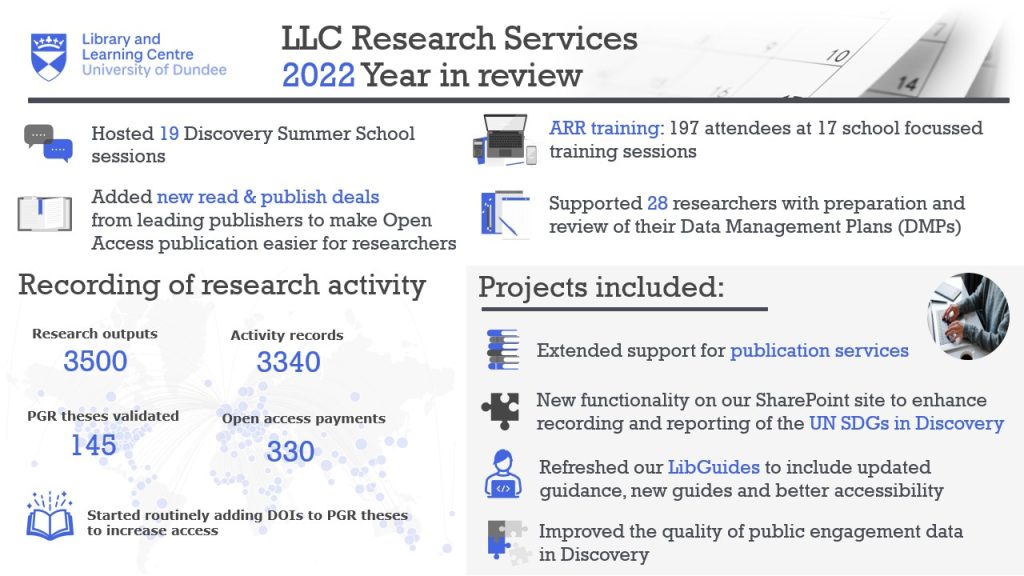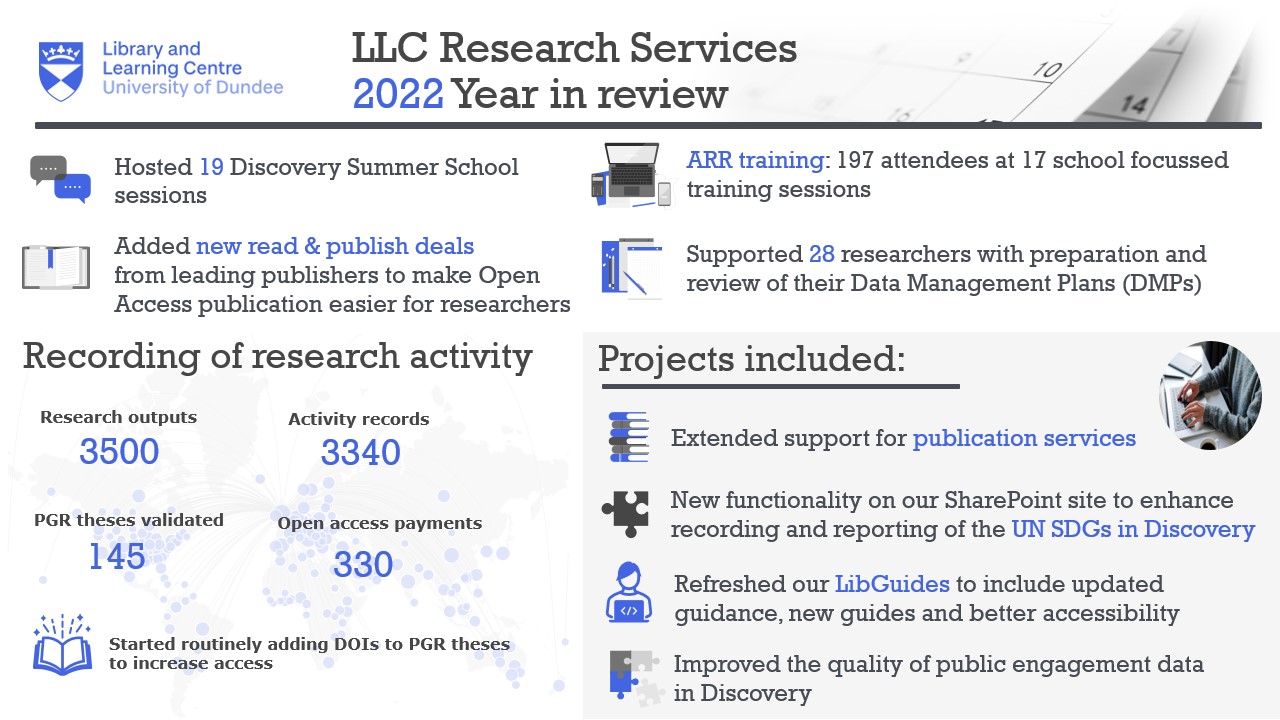Happy New Year from everyone in LLC Research Services!
As we start the New Year our team have been recalling how busy 2022 was, with the services we provide supporting open research practices and research dissemination at the heart of everything we’ve done, and will continue to do in 2023.
We know, for example, that reducing the amount of time our academic colleagues spend on administrative tasks is important which is why, of the more than 3500 research outputs that were created and validated in Discovery in 2022, more than half were created by our team. By doing so, and through careful monitoring of content added to Discovery, we help meet our funders’ open access expectations and also the University’s policies on Open Research and the Publication of Research, both of which require academics to maintain a record of their research in Discovery.

Download a PDF version of the visual displayed above
Open Access Support
Open Access, and supporting our colleagues to be open research practitioners, remains a core purpose with 300 plus open access payments administered by us, alongside making sure that where funding for open access isn’t available, we provide OA through alternative routes. Working together with our colleagues in LLC Resources, we have added a number of Read & Publish deals from leading publishers such as the American Chemical Society, the Biochemical Society, the Company of Biologists, Elsevier and JMIR Publications to make Open Access publication easier for researchers. Our work has led to us being ranked 4th in the world by the Leiden Global Rankings (2017-2020) for the high percentage of our outputs made open access (92.6%).
Recording Activities in Discovery
In 2022, led by a need to record engagement and measures of professional esteem, we developed and improved our advocacy and support for recording activities. These developments saw a huge increase in activity recording, more than doubling on the previous year’s additions, to over 3340 in 2022, helping individuals, Schools and Professional Services colleagues build a better understanding, and report upon, research-led and teaching-led activities across different University communities.
Research Post-Graduate Theses
Our continued support for post-graduate students saw Tom and Yvonne validate 145 theses for archiving. Our theses records are harvested by the British Library EThOS service, increasing their dissemination, visibility, and reach as part of a nation-wide initiative. Combining EThOS data with Discovery’s we can see that in 2022 University postgraduate research theses were downloaded over 44000 times by researchers from 184 different countries.
Research Data Management
We’ve also seen an increase in requests for Research Data support with steadily increasing use of the new Safepod, which not only provides easier, secure, access to data but also removes the need to travel to more distant data centres, thereby reducing our carbon footprint, and those of researchers travelling from neighbouring universities. Alongside this service we have continued to directly support data management planning for many researchers over the past year.
Advocacy and Outreach
The Discovery Team (Emma, Michael and Tom) did a great job of supporting academics to maintain their Discovery Profiles, providing training throughout the summer and in the run-up to the Annual Research Reviews (ARR).
Discovery Summer School Online Drop In Sessions: 19 delivered between July and September.
ARR School specific training: 17 sessions, attended by 197 academics.
Between January and August we contacted and welcomed approximately 75 new staff to our academic community, offering them Discovery training and informing them of the additional research support available. We hope to pick up this service again as soon as possible in the New Year.
Our social media activities continue to provide information about our services and changes to the open research environment through our blog and Twitter account, @UoDOpenResearch. Our most read blogs covered the new Scottish Universities Press, the Safepod, and DORA, the Declaration on Research Assessment.
During 2022, we continued to liaise with other institutions which use PURE, presenting a paper, ‘Impact, evidence and support at the University of Dundee: reframing our use of the impact template in Pure’, at the Pure International Conference in Porto in November.
Developing our services for recording research and research dissemination.
We’ve responded to our service users’ needs by creating new processes to record research-related funding, multi-component outputs, public engagement evaluation data and, in collaboration with the University Research Impact Manager, updating and improving how Discovery can be used to record impact and evidence of impact.
We helped with the development and launch of the new student journal, The Journal of Social Science Student Research, and have continued with our support of IJELT. Of significant importance is our involvement with the Scottish Universities Press which aims to “… provide a clear and cost-effective route for researchers to make their work freely available to a global audience, meeting the requirements of funders and realising the ambition to extend the impact of research across society.”
We’ve also published our first item on our new ISSUU site, which we hope to make more use of in the coming year. If you’re interested in learning more, please get in contact!
Reporting on the UN Sustainable Development Goals
We’ve developed functionality within our Sharepoint site to help academics identify and apply SDGs retrospectively to outputs, facilitating a more accurate picture of which SDGs our communities are working towards. This is important, particularly to those working outside STEM subjects, where SDGs are less likely to be identified by algorithms and other data harvesting tools. We’re hopeful that this data will be a useful source of information to the University which can be analysed in more detail over time.
What does 2023 have in store for us?
Well, we can’t predict the future but we do know that we have to hit the ground running in January with ARR support and, where possible, data match content in Discovery with the ResearchFish submission! But apart from the day to day activities, we’re keeping an eye on the scholarly publishing landscape, increasing our service provision and monitoring changes nationally and internationally that impact on our ability to deliver open research support. These include further investigation of a Rights Retention Strategy, potential future REF strategy and research data curation. During 2023, we also intend to begin work on a new Discovery Research Portal which will offer more variation for Schools, disciplines and individual researchers, and we will be liaising with all key stakeholders as the project progresses.
As always, we look forward to working with you all in the New Year!
